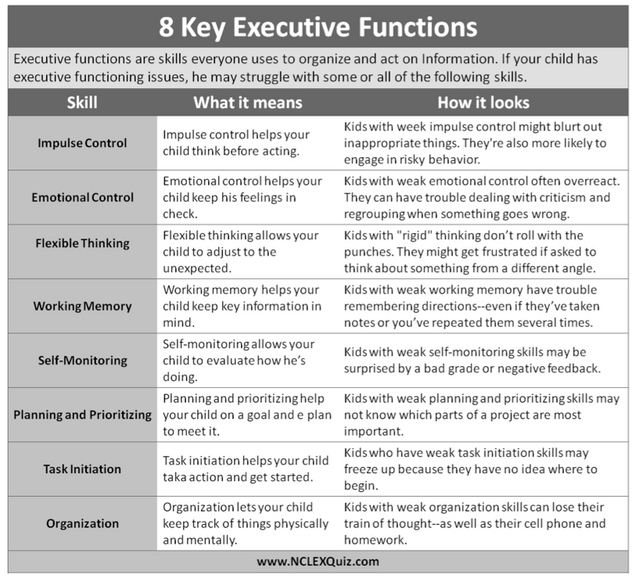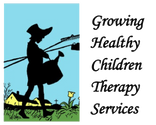Growing Healthy Children Newsletter, April 2018
“When they use strategies that address the core executive function processes, they also become independent learners and flexible thinkers, and can more easily bypass their weaknesses while using their strengths to learn efficiently.” –Dr. Lynn Meltzer

How can you help build Executive Function skills in your child?
To view this chart of 8 Key Executive Functions in full size you can go to the PDF of our newsletter:
For Professionals: This is a great online course appropriate for: Psychologists, educational therapists, speech pathologists, occupational therapists, educators, behavioral therapists, and ADHD / life coaches or other professionals helping those with executive function deficits.
https://executivefunctioningsuccess.com/professional-training-course-landing-page/
For Parents and Professionals: We love the book Smart but Scattered, the Work Smart Academic Planner, and all of the information on this website: http://www.smartbutscatteredkids.com/
“Sensory Over-Responsivity can look like attention challenges . . . .If you had a cactus in your shirt, you would be distracted too!” –Robyn Chu, OTR/L

The Executive Function of Impulse Control from a Sensory Processing Perspective
Impulse Control, according to the McGraw-Hill Concise Dictionary of Modern Medicine, is the degree to which a person can control the desire for immediate gratification and may be the single most important indicator of a person’s future adaptation in terms of number of friends, school performance and future employment. Clearly, we want to support our children in developing this critical executive function.
When some people see a child act in an impulsive manner such as hitting, yelling, bolting, grabbing, or constantly shifting their focus to new stimuli, they consider it behavior problem or an attention problem. We want to build awareness that executive function challenges can also be related to Sensory Processing Disorder (SPD).
The STAR Institue for Sensory Processing Disorder describes Sensory Over-Responsivity (SOR) as a predisposition to respond too much, too soon, or for too long to sensory stimuli most people find quite tolerable. This can result in distractibility as a person feels bombarded with sensations they can’t ignore. SOR can also result in a stress response because sensation (such as touch or smell) is perceived too intensely and as a danger. They may experience an intense need to lash out or escape (fight or flight) or to seek out something that feels good to the exclusion of all rules or social expectations.
The STAR Institue for Sensory Processing Disorder describes Sensory Craving (SC) to occur when an individual is driven to obtain sensory stimulation, but getting the stimulation results in disorganization and does not satisfy the drive for more. If a person has SC they may be constantly trying to touch objects, move rapidly through space, or use their muscles forcefully. Again, this can occur in spite of all rules or social expectations because the SC drive is so strong and hard to satisfy. This individual may appear distracted, unsafe, or unable to stop seeking the desired input without excessive effort.
For some children, understanding and supporting their sensory processing needs is an important step to improving their capacity for impulse control.
Additional Resources and GHC News Updates

Would you like an overview of executive function from an occupational therapy perspective?
Check out last month’s community education series presented by Tracey Davis, OTR/L. You can view the recorded presentation even if you missed it live. www.ghcot.com/community-education-series-seminars/
“10 Fun Game to Practice Self-Regulation Skills (no equipment needed)” Play these simple, fun, everyday games that help with impulse control, cooperation, body awareness and listening skills. www.yourtherapysource.com/blog1/2017/05/16/games-practice-self-regulation-skills/
We love these self-awareness work sheets for teens and young children with executive function challenges: www.understood.org/en/about/search-results?q=self%20awareness%20worksheet
Growing Healthy Children is now on Instagram! Follow us at #GrowingHealthyChildren. This month we ask you to share stories of joy and struggle and success with your family and executive function challenges. We would love images taken by your child or taken from their point of view.
Coming up in our April community education series: ”Positive Reinforcement Strategies- Overcoming Family Drama”. Please join us on April 9th at 7pm PST. Listen to the live call and participate in a discussion/question and answer session after the presentation. If you cannot listen live, you will be given access to a link for listening at your convenience. Go to our website to register: www.ghcot.com/community-education-series-seminars/

Growing Healthy Children Therapy Services
3498 Green Valley Rd
Rescue, CA 95672
530-391-8670
www.ghcot.com
